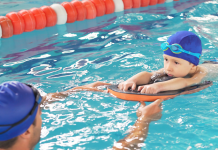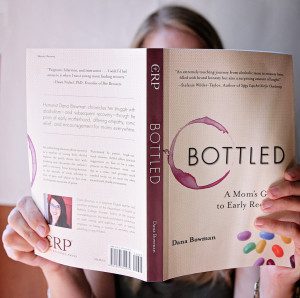Dana Bowman is a writer with an extraordinary talent for turning bad situations into hilarious prose. Her first book, Bottled: A Mom’s Guide to Early Recovery, explores her own story as a person in long term recovery from alcohol addiction. But even more importantly, it adds in a dose of much needed humor. While addiction is not a laughing matter, dealing with early recovery, especially when you are the mother of young children, is a journey where sometimes you just have to laugh to get through it. Dana’s journey is touching and heartfelt.
Full disclosure, Dana is my fellow warrior mama on my own recovery journey. I couldn’t be prouder of what she is doing with this incredible book!
I asked Dana a few questions about her journey, and I loved what she had to share.
Tell us a little about your recovery journey?
I was born as a small child… (just kidding!) My recovery is best summed up this way: My dad and my brother are (were) both alcoholics. My dad lectured me for AGES to beware, and I thought I was smarter. And then, after the anxiety and worry of having two babies 18 months apart, and also trying to maintain my ideals of perfectionism, workaholism and supermom-ism, I totally dove into wine each night. My drinking took off after Charlie’s (first son) birth, but I did stay sober during Henry’s (second son) pregnancy. This made me feel like I was “OK.”
How did early motherhood affect your recovery process? What tips can you give to other mother’s who might be struggling in early recovery?
Simply put, I am a control freak. And little babies (toddlers, small children, any children, teens, spouses… PEOPLE) are not controllable, really. Not at the level that I wanted. I was a frustrated worrier, reading every parenting book and vacillating between overanxious helicopter mom and totally numbed out mom. I could detach so well I think I even seemed cold and distant to my family and children. This haunts me. But now, I see it as a coping mechanism, trying to deal with the increasing surety that yes, I was an alcoholic, and no, I did not WANT to stop drinking.
All that said – what tips do I give the mom who is strung out, scared, worried, so anxious that the wine seems like the best (and only) way to aid it? I completely get it. But there comes a time when you’re gonna start reaching for that glass — a little itching thought in your brain is going to say, “This isn’t OK. This isn’t just a glass here or there. This is a deep need, and I can’t seem to stop.” Be ready to accept the deepest truth I couldn’t accept for so long: Your soul is worth MORE than a glass of wine.
You first “came out” about recovery on your blog, Momsie. What was that like?
IT TOTALLY FREAKED ME OUT. Totally. Like, I pushed “post” and walked away and felt sick. I wandered around my house for an hour, picking up things, putting them down, trying NOT to check the feed and see if I had horrible comments. But, it totally made sense. I wanted to use the blog to help my freelance work, and a lot of my writing was recovery related. So, how could I not?
After your post about recovery went viral, how did your life change? What was the transition like?
It didn’t go like crazy viral, we’re not talking Kim Kardashian’s naked booty or anything, but it was surreal to be on Huffington Post Live. I did the interview up in my kids’ playroom because that’s the only place where the lighting seemed OK, and later, I watched it and thought two things: My VOICE sounded like Minnie Mouse on helium, AND my cat was sitting on the chair behind me above my head. Every once in awhile, I could spot a little white paw coming down… I don’t think it was at all visible to the watchers, but to ME it was AWFUL! I was photobombed by a cat!
Anyhow, the whole thing went crazy and then it all settled down again. For a few weeks I avoided my friends in my small Kansas town because I didn’t really know how to talk to them. I didn’t know if they had read the article (I have a lot of readers from my town, of course. Small town!) and then I thought I should just tell everyone my life story (and maybe even cry) each time I saw them. And then my husband told me something rather colossal. He said, “You know, Dana, they might not even really be thinking about you nearly as much as you think they are.”
GENIUS. It all worked itself out, and now I go out of my house on a regular basis! 🙂
Your book focuses on the first year of recovery. What made you decide to focus on that time period?
I wanted to show my readers how quickly the drinking can catch up on you – so I start with about a year before my recovery. It was scary how FAST my drinking escalated, and this is a common problem. We so often think we have it all under control and then WHAMMO. We are stuck.
The thing with the first year is – you are getting a foundation that will take you (one day at a time) into your full life. So, those first new habits (how to deal with cooking pasta e fagioli without drinking all the red wine, for example) will grow as you grow in recovery.
Are there warning signs to look for when evaluating their drinking or the drinking of someone they love?
We alcoholics are tricky. We can be “highly functioning” for so long, and can get really good at hiding our obsession w/alcohol, so that when you DO think you see red flags, it can be tough to discern.
Some things to watch out for: hiding bottles. Your loved one picks fights, forgets things, sleeps at weird times or all the time. Erratic work history, calling in sick a lot. How often are they drinking?
Check bank accounts. Money disappearing? Huge sums to liquor stores? (That’s not a red flag, that’s just proof.) And what if you confront? There will be tears, or accusations of spying, or meddling, or rationalizations, or lots and lots of promises… If this happens more than three times, you are now stuck in enabling zone. Make some boundaries, get help, counseling and get to work. Loving people is hard work sometimes.
But, please note: I AM NOT SAYING IT’S YOUR JOB TO FIX HER! NOT at ALL. It’s your job, however, to confront, point out, and makes some boundaries. The rest is up to him or her.
Why do you feel it’s important to talk about recovery in women, and especially in mothers?
The CDC has noted that binge drinking and alcoholism among women (especially mothers) has reached an epidemic level. I cannot fathom this. Epidemic. But, from what I have observed, SO MANY women have said, “Me too. Me too.” or “Yes, my mom. My sister. My aunt. My best friend… They need this book.”


















I would love a copy of Bottled !
Thanks, Belinda! Comment on this post for your chance to win:
https://www.facebook.com/KansasCityMomsBlog/posts/934560886619123